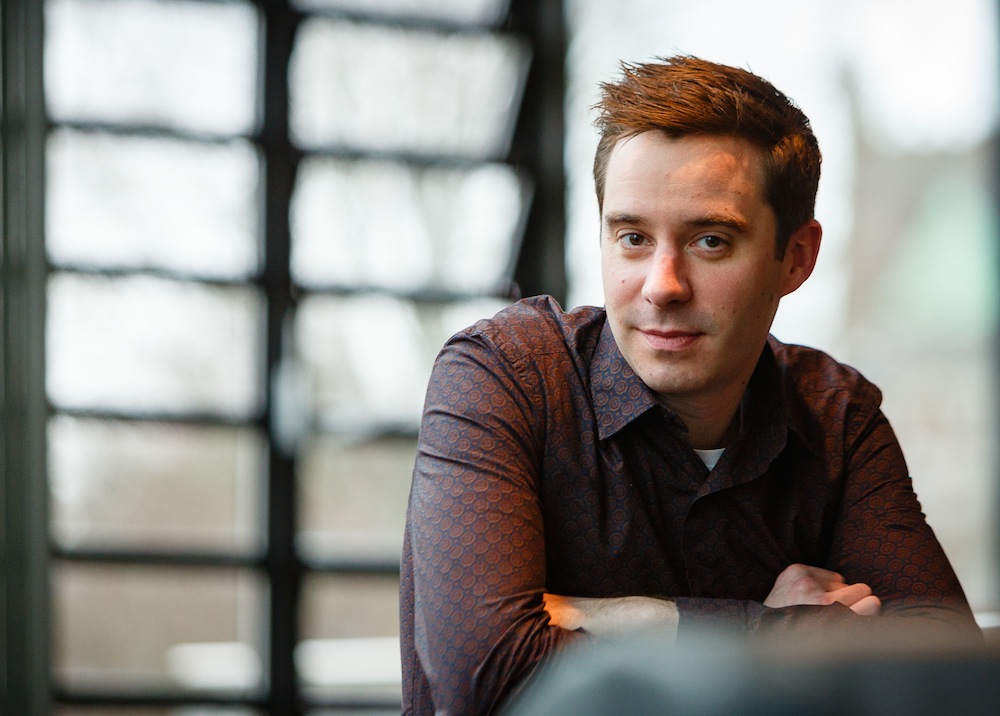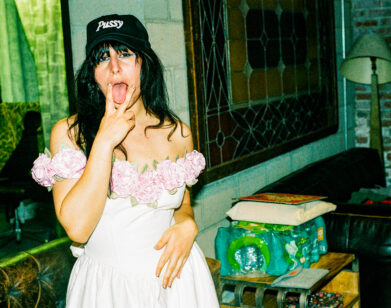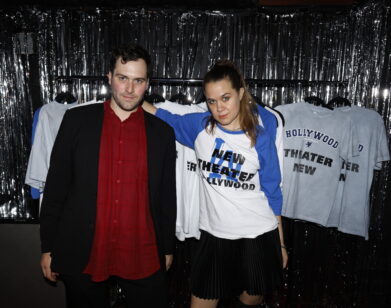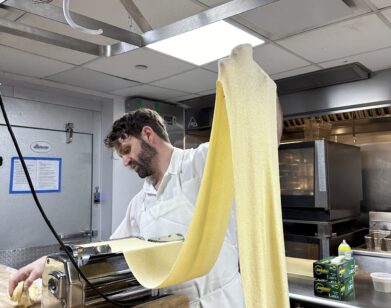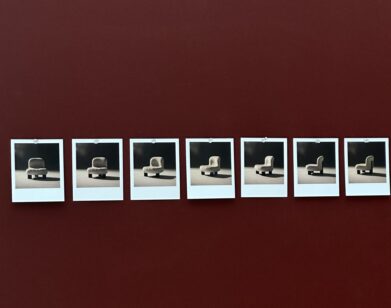Privacy at the Public
Midway through the second act of Privacy—currently running at The Public—Edward Snowden delivers parts of a monologue from The Tempest via video conference. The cameo only lasts two minutes, but it is at once disorienting, exhilarating, and dream-like—a sort of turning point for the play: Before Snowden, After Snowden. It is an apt metaphor for the rest of the show, which examines the shadowy implications of technology supposedly there to make our lives better. Snowden, after all, was among the first to pull back the veil on our veneer of privacy. (The Tempest also has special significance, which we won’t reveal here.)
Conceived by James Graham and Josie Rourke, Privacy was first staged in 2014 at the Donmar Warehouse in London. Graham, an accomplished playwright, and Rourke, a celebrated stage director, collaborated on the research; Graham wrote the script and Rourke directed it. At the request of The Public, Graham and Rourke revamped the script for an American audience and shipped it overseas, where it’s running until August 14. Daniel Radcliffe leads the cast as a heartbroken writer, reeling from a breakup and mired in technologically induced existential dread. His five castmates take on dozens of roles, many of which are real-life characters—academics, engineers, policymakers, and CEOs—interviewed by Graham and Rourke. While narrative in scope, the story is investigative in spirit. It’s also highly interactive: all we’ll say to that end is audience members are encouraged to keep their phones on during the performance.
Graham has written over a dozen plays and musicals, and one movie (X+Y, in 2014). Most of his work is politically charged and borrows liberally from current events. We reached him by phone, on his last day in New York. He’ll be heading back to London tomorrow.
MATT MULLEN: I’m curious to hear—what was it like adapting the play for an American audience?
JAMES GRAHAM: When Josie and I first built this show in London, I think we were very proud of its scale and ambition. But I think we both realized that because of the haste in which we were responding to events, it meant that it was only steps towards the destination we hoped to get to. This time around, it was a calmer process. We had access to everyone we wanted to talk to. One of the ironic things was that there were a few legal restrictions on what we wanted to do the first time in the U.K. Luckily here, because you have freedom of information—freedom of speech—we could push farther with what we wanted to say, and with the interactive elements.
Because the nature of this show, it changed a lot during previews. It’s very living thing—so not only were we rewriting and changing it furiously in the rehearsal room, but all through the first two weeks of the show and audience, we were going in every day after and changing things and adding things and writing new things out every night.
MULLEN: Some people are saying this is less like a play and more like an interactive lecture, or performance art. Would you care to defend the piece as indeed a play, with narrative structure and all that? Or do you kind of see it as something else entirely?
GRAHAM: I would defend it as a play. I guess I kind of take issue with anything that tries to label what a play should be. I think assumptions like these are quite narrow; when people think that a play should do this and have this and be this. Josie and I were trying to push the boundaries of that, and test and challenge and excite people. But I suppose, beyond what people conventionally think of being a play—in terms of a piece of literature that gets written, and then staged, then produced—this is more of a theatrical experience.
MULLEN: I would agree with that. To go back in time, can you take me through your inspiration for writing this? Was there something in particular that inspired you?
GRAHAM: I’ve always been personally fascinated by my own difficulties around relationships and publicity. I don’t just mean in the celebrity sense, but I mean in the sense of going to parties and walking up to people and talking about myself—that balance between what do I share, what do I not share? Or in my relationships, which I should say, have suffered—whether that be with friends, or family, or romantic relationships. You know, things that we all experience when we grow up—I guess it just took me a bit longer to work out, to balance. I always wanted to interrogate it.
Increasingly over the past five, ten years, I’ve been fascinated by the changes that technology and software—particularly social media—have brought upon our relationships, and how we interact with one another and how we view ourselves. And the pressure to live publicly and to rate our own existence. It all came together after the Edward Snowden leak. Obviously I’m a political guy—I always look for a political way into any story, and that’s what provided it.
MULLEN: I keep thinking about Snowden’s cameo. It was so amazing. That was a pre-recorded bit that he did, right? He was not giving the monologue live?
GRAHAM: No, I wish he could come live every night, but I think the time difference in Moscow would make that impossible. So it was a pre-recorded scene that we did with him. I’m glad it affected you. I think the experience of doing that was probably life-changing for me, too. He was in a presence in my life for so long with play, that to finally meet him—you know, across encrypted channels—but to finally meet him was a huge experience.
MULLEN: How did you go about approaching him?
GRAHAM: We began approaching him when started work in London actually, but it was much harder—these things can take time, I guess, and maybe we had to prove ourselves with the London production first. Also I guess in 2014 he was much busier, in a political climate that is possibly much testier than it is now. So when we finally returned to the show in New York, we got back in touch with him through various channels. We’d worked with The Guardian team who’d broken the original story, and they helped us both get access in one way. Then we worked with his lawyer, who was very helpful. Then, to our surprise, about a week before we opened, he came back to us and said that he’d be really interested in contributing something. At that point we had no idea what that would be. Would it be an interview like we did with all the other real life people or should it be something else? It was Josie who came up with the idea of him reading The Tempest. We thought it would maybe be fun to give Edward Snowden his Shakespearean debut on the New York stage. And that’s what we did.
MULLEN: Well, he did excellently. It was a great reading.
GRAHAM: He did. I was so impressed. He clearly prepared as well. By the time we got online with him he had all these questions about the meaning of the text—it was absolutely incredible. I loved it.
MULLEN: How active are you personally on social media? You have a Twitter, you use it pretty regularly, it looks like. But are you in any way more selective with your online presence having gleaned all this knowledge and done all this research?
GRAHAM: That’s so funny, even though I know all this is publicly available, I still go, “Oh my God, he’s seen my Twitter, that’s so weird!” [laughs] Come on, I’ve done this play. I know it’s possible. It’s not weird at all. So, yes. The thing about the play is—I hope anyway—that even though we aim to delight and shock in equal measure, we don’t want people to throw their cellphones away and we don’t want people to kill their social media profiles. I think it’s all about being conscious of what you’re giving away, being happy with the balance of that transaction and being in control of that state. And also of your emotional, mental health when you’re using these devices, and about letting people into your mind and into your world. So I’m not against them. I think I have changed my behavior around them both in terms of usage—how much I use them—and I guess also what I use them for. I recently took a very uncharacteristic one-week vacation after the show opened and I made a conscious decision that every time I experienced or saw something beautiful along the Pacific Coast that my hand wouldn’t reach instantly into my pocket and pull out my cellphone and share it with the world and measure the value of that experience by how many likes it got. I’m trying to just use it to communicate, to engage, to discover, to learn, but not to validate any part of my life. Because I imagine that would just lead to incredible unhappiness.
PRIVACY IS RUNNING AT THE PUBLIC THEATER IN NEW YORK THROUGH AUGUST 14.

